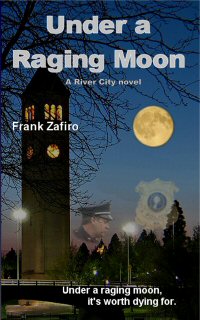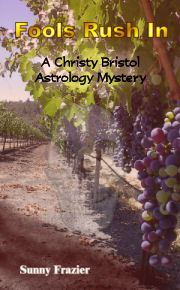 |
Wolfmont Publishing
This month Mysterical-E features Tony Burton's Wolfomont Publishing in our Publoisher's Spotlight. Tony graciously consented to an interview and we think you'll find his conversation with us not only informative but also entertaining. He's an energetic man who has an abiding respect for the field in which he works. • Can you give us a basic overview of Wolfmont? Wolfmont started out in late 2005, in truth, as a self-publishing effort. Since that time I've published only two of my own books, and eight other titles. I started out focusing on crime fiction (mystery, etc.) but since that time have broadened my view of what I want to publish. Late last year I started a new imprint, Honey Locust Press, to handle what I term “more family-friendly” works, and it is more eclectic in the range of titles that it will handle. While I have published four novels, I'm especially proud of the anthologies because I really, really believe in the short story and its value as good fiction. Short stories are NOT dead, in my opinion, and I hope that by publishing anthologies of them I can help to put that idea aside. And, by putting well-known authors in the same books with some emerging authors, I hope the lesser-known authors can garner some new readership and get exposure they might not have gotten otherwise. One of the things I'm proudest of is the annual Toys for Tots effort. Last year, as a sort of spur-of-the-moment thing, I decided to put together an anthology of Christmas-oriented crime stories (BY THE CHIMNEY WITH CARE) and give all the profits to the Toys for Tots. We ended up donating $1,365 to the Marine Corps for the program. This year, we released another anthology on October 1, titled CAROLS AND CRIMES, GIFTS AND GRIFTERS and I'm in hope that we will do even better than last year.
• What made you decide to go into publishing, considering what the business is like these days? Egads. I ask myself that question quite often, all things considered. I don't know if it was hubris or ignorance, or both. • Was there a special epiphany moment when you said to yourself, “This is what I want to be doing with my life?” • How long did you debate with yourself about this and what pushed you over the edge into actually doing it? • How did you find out what you had to do? I mean, a person doesn't just wake up one morning and say, “I think I'll start a publishing house.” And then begin publishing books. Well, I was one ignorant sod, as they say in the UK . I really didn't have a clue, and that's the truth. I tried things that didn't work (printers who were not so good, software that was not so good, etc.) So I bought some great books on the subject, and I read like a madman. Poynter's books have some great advice in them, although now that I've done this for a while I don't necessarily agree with everything he says. Peter Hupalo also has a good book on the subject. I joined the PMA and SPAN. I learned a good bit by trial and error. My first ISBNs I bought in a block of ten. The next time I bought them, I bought a lot more than that. As I said, I joined PMA and SPAN, and have gotten a lot of great information from both of those organizations. PMA especially has a great monthly magazine with fantastic information, and they conduct seminars both in various locations and on the Internet. • What was the most difficult part about starting up? Spending the money… or rather, DECIDING to spend the money. I had “about-to-buy” remorse constantly, because I had already discovered from my reading that publishing is very, very rarely a profitable experience for a couple of years. It made me nervous to spend money I really didn't have, in order to make money I wasn't sure I would make, by selling books I had not yet even edited much less printed. • What was the easiest part/most pleasant part about starting up? Working with some of the authors. Not all of them, and that's the truth, but some authors are wonderful “partners.” They understand the editor's concerns, they are not so in love with their own words that they can't see the need for revisions…that sort of thing.
• What was the first book you published and why? Other than my own book, the first book was the anthology I talked about before, SEVEN BY SEVEN. Those seven authors were chosen by auditioning a story. I asked for people who liked to write flash fiction to write a story, no more than 600 words, with a theme of the deadly sin of “Envy.” I had a few respondents and I picked out my favorites. I told them what I had in mind: a books with forty-nine flash stories about the seven deadly sins, and we talked it over by email… and they all came on board. • What was it like working with this first writer/project for Wolfmont? Well, I discovered that work as a project manager and military middle-manager prepared me to be a slavedriver or that's what they called me, anyway. But I think they said it in an affectionate fashion, at least most of the time. From the first day the writing assignments were given to the release date was less than three months, and that includes editing, cover design (which I did), blurbs—the lot. • What was the most important thing you learned from this first time? I think that I learned that I needed to simplify the royalty process. I had this really complex process in place, to try to be fair to all concerned about the sales proceeds, and it was an accounting nightmare. Now, I do things more simply, especially for anthologies. • What were the next projects and how did you find them or they find you? My next project was UNDER A RAGING MOON by Frank Zafiro, and I believe Frank came to me for a couple of reasons. First, he was one of the authors in the SEVEN BY SEVEN project and he seemed to like the way I did things. Secondly, he wanted to get the book out quickly, and he realized that a lot of the bigger houses take a LOOOONG time to get a book on the street. He had seen the speed with which we got the anthology on the streets, and he wanted that sort of turnaround, I think. And I liked Frank's manuscript. UNDER A RAGING MOON is tightly written, has a lot of drama, the characters are very three-dimensional and real—in all, a very well-done book.
• How do you choose projects – what are the major factors? It's funny, really. Sometimes a project will appeal to me because of the storyline, sometimes because of the characters, and sometimes because of the timeliness of the subject matter. It's not all about the book, though. I've learned that a wonderful story can be written by an author who is clueless about the business, and who has no desire to learn. I've had some great stories to come across my desk, but when I discussed the marketing aspects of things, the realities of the money and the potential readership, the deal fell through. Some authors don't believe they have any responsibility to sell their book. That's not true any more. Some authors believe they can write whatever they want and the editor will publish it if it's sensational enough. Again, it's not true, at least for this editor. And some authors have heard or read of the big Blockbuster Deals that the occasional unknown author gets, and they seem to think that it's the norm, when it isn't. I really look for, first of all, a good, compelling story that makes me want to read more. Secondly, I look for an author who has an idea of what their target market is. I ask them, “Who is going to buy this book?” Sometimes the answer is, “Everybody!” That's WAY too optimistic, and it shows me that the author hasn't even thought about that part of it. I also look at the author's ability and/or willingness to market themselves and their book. If the author says, “I can't do signings because I don't travel,” or “I can't get up in front of people because I'm phobic!” those are bad, bad signs. I also look at the author's willingness to work with the editor. There is very, very seldom a phrase or word that is so “precious” that it simply cannot be changed or the storyline falls apart. But some writers seem to believe that their story is the exception. • What have been the major pitfalls for you as a small publisher? • And how did you overcome them? Now, while I still do not do blanket returns through Ingram or Baker & Taylor, I will set up a return agreement with an individual bookstore, where the bookseller and I share the risks, and that has been received well. I have the agreement on my website, and the bookseller can download it, read and sign it and fax or post it back to me, and we're in business. • What is the most difficult part of the process – finding writers and good work, editing, promotion, getting writers to cooperate with you on promo, etc.? Gosh, I think that really varies with the project. Sometimes a particular book will be a breeze to produce, but for whatever reason the promotion is difficult. Or sometimes the author has old, arcane word-processing software, and getting the book into an easily editable form is difficult. (I have an author I'm working with now who refuses to have anything to do with the Internet. He sends me manuscripts in an old version of WordPerfect, on 3.5” disks, via postal mail. I had to buy an external floppy drive, because even with four computers in the place, none of them had a floppy drive.) I guess I can say that, in general, promotion is the most demanding part of the process most of the time. There are so many books out there clamoring for the attention of the buying public, and it's getting harder to make one book stand out from the crowd. That's especially so when the big houses have big promotional budgets and can offer thousands of dollars just to get their books on endcaps or near the door of the bookstore. • What do you expect of a writer (other than a great book)? • What can a prospective author say that would make you a happy publisher? “Tell me what I can do to help sell the book and make it a success!” • What should a writer expect of you as publisher? Honesty, even when it hurts. Support. A personal relationship rather than a relationship built upon how much money they can bring in. That I will work very, very hard to make the book the best book it can be. That I will also work very hard to publicize that book, within the reasonable constraints of my budget. They can also expect a fair, even-handed contract with minimal legalese. • What is the advantage of a small press for an author? Well, there are advantages and disadvantages, and I'm the first to tell a person that. Small presses are usually more open to newer authors, the untested, untried writers. But that doesn't mean we can sink major dollars into something that will be very difficult to market. I believe a small press will usually be more receptive to innovative promotional ideas, to the author's input as to cover design and layout. And with a small press you are not one out of four or five hundred authors competing for attention—it's much more personal. • Promotion is paramount – Can you talk a bit about how Wolfmont approaches promotion and what lengths you will go to in order to promote a book? Well, we always go with the standard things: sending out advance copies for blurbs, sending out review copies to a lot of venues, producing ancillary marketing materials such as bookmarks, postcards, flyers, etc. We've also started creating book teaser videos whenever it's appropriate. (Not all books lend themselves to such things.) I have gotten more aggressive with marketing in the last few months, with arranging for radio interviews, both “real” radio and Internet radio. • How involved do you like an author to get in planning and carrying out promotion? • What about bookstores, book-of-the-month type clubs? • How important is the internet in promotion? • What are the five chief promotional outlets? • Are there any promotion secrets that you'd like to share?
• What are the top five things you encourage an author to do after you publish her/his book? • What makes a submission stand out? • What is the most important for you: character, plot, setting, or…? • Is there a list of things you absolutely will not publish? Sadly enough, yes. No pedophilia, even as a crime, if it is “onscreen.” No portrayal of racism or bigotry as a positive thing. No killing of children onscreen. No violence and gore strictly for shock value. No onscreen sex. I know all these things limit me, keep me somewhat out of the mainstream, but they're just my standards and I'm sticking with them. • Have you ever regretted not publishing something? I've regretted not being able to come to an agreement with the author about terms that would allow me to publish something. That amounts to the same thing, I suppose. • And conversely, have you ever regretted publishing something? • What has this venture taught you about yourself? • How have you changed over the time you've been doing this work? • Future/Goals For Wolfmont? • What would you like to see more of in submissions to Wolfmont? At this time, Honey Locust Press offers a couple of ebooks, but sales have been negligible. I think that ebooks have a place, but I'm just not sure what it is! DRM is something everyone hates, yet there are so many pirates out there, all publishers dread that their hard work will end up as BitTorrent fodder. I am actively investigating ebooks and have hopes to come up with some way to do them that is acceptable to the reader and to the publisher (me.) • What is the outlook for the short story – in general? As I mentioned before, I really like short stories, and I think they have a real future. The markets are down, that's a fact, but with the pace of today's lifestyles, I think people like the idea of a story they can read to the end over their lunch break, or while sitting and waiting for their kid to get out of the orthodontist's chair. • Does Wolfmont do collections or do you plan to do collections? • How do you see Wolfmont growing? Into what areas will you expand? What markets will you try to reach? We are in the process of a new venture right now, an audiobook version of an anthology. I think there is a big market for audiobooks, either in CD format or in MP3 format for all those MP3 players out there. And the Honey Locust Press imprint is looking at some other area, too. For instance, we have a title of humorous animal stories in the works, written by a career zoo director who has worked in zoos in the west Pacific and in North America. I'm also exploring the non-bookseller markets right now. As much as I love booksellers (really!), the whole “returns” paradigm is strangling many small presses who sell exclusively through them. That's why I am actively seeking markets like gift shops, coffee shops and so forth. |
|
|
Past issues and stories
pre 2005.
Subscribe to our mailing
list for announcements.
Submit your work.
Advertise with us.
Contact us.
Forums, blogs, fan clubs,
and more.
About Mysterical-E.
Listen online or download
to go.
|
|
|
 |
 |






